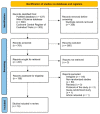Quality of Life of Cancer Patients Receiving Enteral Nutrition: A Systematic Review of Randomized Controlled Trials
- PMID: 34960103
- PMCID: PMC8705712
- DOI: 10.3390/nu13124551
Quality of Life of Cancer Patients Receiving Enteral Nutrition: A Systematic Review of Randomized Controlled Trials
Abstract
Most studies confirm the beneficial effects of enteral nutrition on the quality of life, but some studies indicate an inverse association and its detrimental impacts. However, there are insufficient data on the effects of enteral nutrition on the quality of life of cancer patients. This systematic review aimed to describe the influence of applied enteral nutrition on the quality of life of cancer patients, based on the results of randomized controlled trials. It was registered in the PROSPERO database (CRD42021261226) and conducted based on the PRISMA guidelines. The searching procedure was conducted using the PubMed and Web of Science databases, as well as Cochrane Library, and it included studies published until June 2021. It was conducted to select randomized controlled trials assessing the influence of enteral nutrition (compared with the other model of nutrition) on the quality of life of cancer patients. A general number of 761 records were screened and a final number of 16 studies were included in the systematic review. The studies were included and assessed by two independent researchers, while the risk of bias was analyzed using the Newcastle-Ottawa Scale (NOS). Studies compared patients treated with and without enteral nutrition, patients treated with various methods of enteral nutrition or with enteral diets of various content, as well as patients treated with enteral and parenteral nutrition. Within the included studies, the majority were conducted in patients with cancers located in various parts of the body, or diverse areas within the gastrointestinal system, while some studies were conducted in specific populations of patients with a defined cancer location-esophagus, stomach, or ovary. The duration of applied enteral nutrition within the included studies was diversified-from two weeks or less to half a year or even more. The vast majority of studies used well-known and validated tools to assess the quality of life, either developed for a specific group of head/neck, esophagus/stomach, and ovary cancer patients or developed for more general patient populations. Most studies concerning patients treated with and without enteral nutrition supported applying enteral nutrition, which was concluded in seven studies out of ten (including four studies with a low risk of bias). The other important observations to be emphasized-formulated based on the studies with a low risk of bias-presented the role of oral supportive nutrition guided by a dietitian, as well as the beneficial role of enteral and parenteral nutrition, combined. In spite of a relatively low number of randomized controlled trials assessing the influence of enteral nutrition on the quality of life of cancer patients, which should be considered as a limitation, the results were promising. Most studies supported the positive influence of enteral nutrition on the quality of life, either assessed based on the psychological measures of the quality of life or by considering the other potential determinants (e.g., malnutrition, complications, etc.). Taking this into account, enteral nutrition should be applied whenever possible, both to prevent and treat malnutrition in cancer patients. However, considering the limited number of studies conducted so far, further research conducted in homogenic populations of patients is necessary.
Keywords: QoL; cancer; diet; enteral nutrition; nutrition; oncology; quality of life; randomized controlled trials.
Conflict of interest statement
The authors declare no conflict of interest.
Figures
References
-
- World Health Organizations (WHO) Cause-Specific Mortality, 2000–2019. [(accessed on 5 November 2021)]. Available online: https://www.who.int/data/gho/data/themes/mortality-and-global-health-est....
-
- World Health Organizations (WHO) Cancer. [(accessed on 5 November 2021)]. Available online: https://www.who.int/health-topics/cancer#tab=tab_1.
-
- National Institute of Health (NIH) National Cancer Institute (NIC) Types of Cancer Treatment. [(accessed on 5 November 2021)]; Available online: https://www.cancer.gov/about-cancer/treatment/types.
Publication types
MeSH terms
LinkOut - more resources
Full Text Sources
Medical


